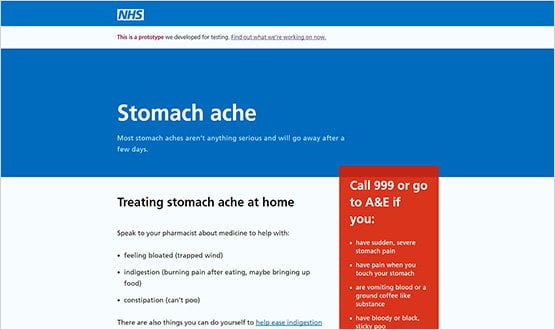A new NHS patient website, NHS.uk, will track users’ browsing history and location to provide them with personalised health advice.
Speaking at a London healthcare event last week, NHS Digital’s digital transformation director Beverley Bryant revealed some further features on the long-gestating NHS.uk project.
These would include providing people with more personalised health advice than the current “flat” information provided by NHS Choices, Bryant said.
“If we can use location, time and cookies and history to provide content to people then it’s likely to be more relevant to visitors, and they are likely to come back for more information.”
People would have to opt-in to provide any of their personal information, location and browser history, she said.
“There is no question that will do anything about them, with them, or for them, without their explicit consent.”
Responding to growing privacy concerns expressed about the plans on Friday, NHS Digital clarified that only browser history within NHS.uk would be tracked, providing consent was given, not wider internet browsing.
Bryant said users that went a step further to register, would have access to a personal health record.
This would allow them to perform transactions, such as booking appointments and repeat prescriptions, access medical records and upload their own app and wearable generated data.
“By giving people more control…we think that people will be able to make more informed decisions.”

“But once we’ve persuaded them, that’s when we can start to make it personal, so that they get an aggregated view of their health; the last time they came, what is the information they asked for, a record of an appointment.”
In a statement, NHS Digital said that NHS.uk, the NHS Choices successor that will host a personal health record, will be rolled out in Autumn 2018. Health Secretary Jeremy Hunt has previously said he intended to launch a personal health record in September 2017.
A beta version of NHS.uk is already live and being tested with users.
“Content development is ongoing and we hope to go live with the enhanced site by Autumn 2018,” a spokeswoman said.
NHS.uk is central to the Government’s latest push for more personalised care enabled through digital tools, as part of the ‘Personalised Health and Care Framework 2020’ framework.
Under the proposals, NHS.uk will host a personal health record, and online NHS 111 tool, and revamped app library.
The theory is that giving people access and control to health information will increase self-management, reducing the burden on the NHS.
Ambitions to provide a national NHS online personal health record and associated transactional services stretch back more than a decade.
However, previous attempts have been hampered by funding constraints, information governance concerns, and an unenthused public.
Speaking to the House of Lords’ Long-term NHS Sustainability Committee in December, health secretary Jeremy Hunt again committed to rolling out an online personal health record in 2017.
“We will have a system where you can go online and identify yourself online without having to go to your GP surgery. That will be very significant, because people will be able to download their record on their phone.”
However, not everyone is convinced that giving people more access to health information will help save the NHS.
Speaking at the same event as Bryant, Paul Cundy, chairman of the Royal College of GPs’ IT Committee, said better patient access to information did not reduce demand.
“Adding a new service simply increases workload.”

Cundy said despite more than a decade “flogging the dead horse” of personal health records, patients were not interested.
“Generally, patients do not want access to all of their records. What they want occasionally is access to some part of their record some part of the time.”


Patients to get access GP records via NHS.uk in September 2017
6 April 2017 @ 09:55
[…] Digital Health News has previously reported that NHS.uk would, with consent, track users’ browsing history within the site and their location to provide personalised health advice. […]
Citizen Identity project will be live by October 2017
4 April 2017 @ 10:09
[…] Year Forward View’, published by NHS England on Friday, confirmed that the public will be able to access their health records through NHS.uk in September this […]
18 February 2017 @ 16:21
As if I’m going to upload all my data in to the NHS that is woefully insecure and then leaks it out the backdoor for undetermined purposes.
17 February 2017 @ 19:39
Would the browser history – whether or not browsing within NHS.uk alone – be made available to other government departments – as PDF data is shared with the Home Office?
How would information searched on behalf of family members (or others) such as information on dementia services, immunisations and travel immunisations for gap years, PSA /breast cancer (if account is held by irrelevant sex) be distinguished from any browsing related to the individual?
Should there be a warning: “If you have looked for information for any reason other than personal health concerns, be aware that this will be recorded as being a personal health concern in selecting results for display on this site”?
BTW if the information is only for browsing on the NHS,uk site, does this mean that either the site is recording everyone accessing the site from whatever device, or that the recording of browsing will only start after explicit consent has been given?
17 February 2017 @ 12:25
The comments here and feedback are blowing this out of proportion. It’s common practice to use your historic use of a website (what you have viewed on say NHS.uk) to personalise content for you… not to spy on you.
This is about personalisation and not snooping on what you have been doing.
I don’t think the right message has been delivered in response to criticism about privacy.
Yes, it would be wrong for NHS.uk to know about other website you have been using, but proper for them to know what you have viewed on their own website so they can deliver the right content to you.
This is the right move for the future.
20 February 2017 @ 10:51
This is standard technology and every other website is already harvesting this information so for anyone to get excited about the NHS doing the same is a bit bonkers.
Microsoft was able to predict those people at risk of a particular condition based on their search habits.
I find it most useful when I suddenly start seeing handbags and shoes being targetted in adverts. At this point I know it is time to hide the credit card.
If you don’t want this to happen you use private or incognito browsing. That’s the world we live in.
That said pushing my wearables data etc into the NHS is another matter altogether.
17 February 2017 @ 11:19
Ben, that doesn’t help if I’ve been browsing STDs (within NHS.uk) before my wife comes along to use the same machine.
17 February 2017 @ 11:02
Hi all,
A NHS Digital spokesperson has clarified its position on this proposal a little today (which a spokeswoman is now describing as “aspirational”). She says it will track browsing history within NHS.uk (not whether your browsing for a new pair of shoes or booking flights to Spain). Also note that the idea is you opt-in to sharing this information, rather than opt-out.
Hope that helps.
Ben
17 February 2017 @ 09:39
Is my browser history going to be part of my personal health record? And if my partner has been looking up their ailments, or other family members’, on the tablet, will my history forever have those down as possibly being my problems? Is that safe?
17 February 2017 @ 09:20
This article really sums up how I feel about Personal Health Records. Significant public money that is being spent on this , I agree with Paul Cundy, I cannot see a mass demand for this and nor is it going to reduce the pressures on the NHS.
I’m all for those that want such access having options made available to them, however it is very difficult to navigate the costs of pushing forward with such projects with the what feels to be, the main demand emanating from commercial interests, not patients.
I do not trust Hunt and I highly suspect this is an opportunity for big pharma and other commercial interests to have access to mine our data. Of course, that will be dismissed right now, however the means to providing access could be opened up at any time. Dare I refer to the care.data saga.
There’s an increasingly slippery slope where it feels the UK views principles such as fair processing and fully informed consent in a very rigid (one size fits all) and inflexible way and if the population does not understand or appreciate it then access to their data will broadened beyond those involved in providing their care. Yes, I’m referencing the proposed new Opt out model that the Government seems to have sat on for several months.
I agree it makes sense for the NHS to better utilize information to provide more effective and efficient services but that has to go hand in hand with concrete assurances about data security and sharing. I believe we are no where near that level of confidence and yet I frustratingly look for such assurances in every article I read on wider data sharing and Personal Health Records.
16 February 2017 @ 18:42
Why on earth should it be allowed access to the browser history?
William
16 February 2017 @ 10:03
If the proposed system is transparent, with explicit published algorithms and the facility to correct errors identified by patients, this initiative may well prove useful. O’Neil (Weapons of Math Destruction) outlines the dangers of not adhering to these principles.
I worry that if the system is subsequently outsourced to commercial interests, there is a high risk of data mining (using opaque, copyright, and hidden algorithms) to sustain commercial viability. Moreover, if there is also no possibility of system learning – ie making adjustments to account for identified errors, unintended consequences are almost certain to arise.
As O’Neil well describes, such consequences would adversely affect the most vulnerable and those at the margins of society. There need to be robust safeguards against such possibilities.